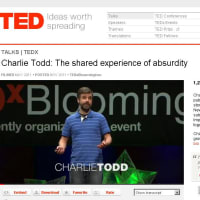
内向的(introvert)なことはいけないことでしょうか?
人口の3分の1は内向的なのに、その力を抑え込むのは社会にとって大きな損失では?
この疑問を投げかけたのはスーザン・ケイン氏。
弁護士になった後、自分の内向性と向き合ってベストセラー本を生み出した作家ケイン氏の言葉をご紹介します。
※動画はTEDのサイトから。日本語字幕付きで見ることができます。
http://www.ted.com/talks/susan_cain_the_power_of_introverts.html
※TEDとは、価値のあるアイデアを世に広めることを目的とするアメリカの非営利団体。1984年の設立当初は、「技術」「エンターテインメント」「デザイン」の3つの分野からスピーカーを集めて会議を行っていた。その後、あらゆる分野における最先端の人々が集まる場へと発展。TEDトークと呼ばれるプレゼンテーションの動画を世界に無料配信して注目を集めている。スピーカーのリストには著名人がずらりと並び、wikipediaの創設者ジミー・ウェールズ、amazonの経営者ジェフ・ベゾス、U2のボノ、精神科医のオリバー・サックスなどの名前が含まれている。現在は、1年に1回カリフォルニア州のロングビーチで行われる大会を中心に、世界各地に活動を広げている。(http://www.nhk.or.jp/superpresentation/about/)
(start)
9歳の時初めて サマーキャンプに参加しました 母はスーツケースいっぱいに 本を詰め込んでくれましたが 私にとってはごく普通のことでした 私の家では 読書が主たるグループ活動だったからです 非社交的だと思うかもしれませんが 私たちにとっては それが一種の交流方法だったのです 家族が揃っていて 人の温かみを身近に感じながら 同時に 心は冒険の国を好きに 飛び回らせることができるのです キャンプというのは それの デラックス版なんだと思っていました (笑) 10人の女の子が山小屋でお揃いのパジャマを着て 楽しく一緒に読書するのを想像していました
でもキャンプは いわばアルコール抜きのどんちゃん騒ぎでした キャンプ初日に世話役の人が 私たちを集めて チアを教えました キャンプの精神が身につくよう これから毎日やるんだと こんな感じです 心の中では ただひたすら 早く解放されて 本を読みたいと思っていました
でもスーツケースから本を取り出していたら 部屋で一番いけている女の子が来て 「何でそういつも物静かにしているわけ?」と言いました
その次に本を読もうとしたときには 世話役の人が心配顔でやってきて キャンプの精神を繰り返し みんな めいっぱい活動的に やらなければならないと言いました
今回はサマーキャンプの話をしましたけど 50個くらいある似たような体験のどれでも良かったんです 静かで内向的なのは正しくない もっと外向的な人間として認められるよう 努力すべきだというメッセージを いつも受け取っていました そして心の中で そんなの間違っている 内向的なことに― 悪いことなんてないのにと感じていました でもそういう直感をずっと押し殺していて こともあろうに金融街の弁護士になりました
"When I was nine years old I went off to summer camp for the first time. And my mother packed me a suitcase full of books, which to me seemed like a perfectly natural thing to do. Because in my family, reading was the primary group activity. And this might sound antisocial to you, but for us it was really just a different way of being social. You have the animal warmth of your family sitting right next to you, but you are also free to go roaming around the adventureland inside your own mind. And I had this idea that camp was going to be just like this, but better. I had a vision of 10 girls sitting in a cabin cozily reading books in their matching nightgowns. "
"all the times that I got the message that somehow my quiet and introverted style of being was not necessarily the right way to go, that I should be trying to pass as more of an extrovert. And I always sensed deep down that this was wrong and that introverts were pretty excellent just as they were. "
今隣に座っている人は内向的かもしれません その人たちはみんな 社会に深く根ざした 現実の偏向によって不利を被っているのです 私たちはみんな それを言い表す言葉も知らない― 幼い時期から 自分の中に取り込んでいるのです
…内向的な人は、それがよくないという社会の見えない圧迫に苦しんでいます
“the person sitting next to you right now -- all of them subject to this bias that is pretty deep and real in our society. We all internalize(取り込む) it from a very early age without even having a language for what we're doing.”
「その偏向がどんなものか把握するには 内向的なのがどういうことか理解する必要があります これは内気とは違います 内気というのは 社会的に判断されることへの怖れです
内向的であるというのは 社会的なものも含め 刺激に対して どう反応するかということです
外向的な人は多くの刺激を強く求めますが 内向的な人はもっと静かで 目立たない環境にいる方がやる気になり 生き生きとして能力を発揮できるのです」
"Shyness is about fear of social judgment.
Introversion is more about, how do you respond to stimulation, including social stimulation."
「ある種の信念体系があって 「新集団思考」と私は呼んでいますが 創造性や生産性はもっぱら 何か社交的な場から生まれるのだと考えられています」
"And also we have this belief system right now that I call the new groupthink, which holds that all creativity and all productivity comes from a very oddly gregarious(社交的な⇔shy) place."
実際歴史上で変革を成し遂げたリーダーには 内向的な人が たくさんいます たとえば― エレノア・ルーズベルト ローザ・パークス ガンジー 彼らはみんな自分を無口で 静かな話し方をする
そして彼らは表に立つことを 心底嫌っていたにもかかわらず 世の注目を浴びることになりました
そのこと自体が彼らに 特別な力を 与えています
人に指図したり 注目を浴びるのが 好きでやっているのではなく 自分が正しいと信じることのため 他に選択肢がなくてやったのだと みんな気づくからです
"some of our transformative leaders in history have been introverts. Eleanor Roosevelt, Rosa Parks, Gandhi . And they all took the spotlight, even though every bone in their bodies was telling them not to. And this turns out to have a special power all its own, because people could feel that these leaders were at the helm, not because they enjoyed directing others and not out of the pleasure of being looked at; they were there because they had no choice, because they were driven to do what they thought was right. "
私が言いたいのは 社会として両者をもっとうまく バランスさせる必要があるということです

画像は[1分TED]「内向的な人のパワー」 スーザン・ケイン | Edu Dev.net:から拝借させていただきました。
孤独が得てして創造性の 重要な要素になっているからです
ダーウィンは 1人で森を長時間散歩することが多く パーティの招待はきっぱり断っていました
ドクター・スースとして知られるセオドア・ガイゼルは あの数々の素晴らしい創作を カリフォルニア州ラホヤの自宅裏にある 孤独な塔のような書斎で生み出しました 彼は本当のところ 読者である小さな― 子どもたちに会うのを 怖れてさえいました 無口な自分は 陽気なサンタのような― 人を想像している子どもたちを きっとがっかりさせてしまうと思ったのです
最初のアップルコンピュータを作った ウォズニアックは 当時働いていたHPで いつも自室に1人閉じこもっていました 子どもの頃いつも家に閉じこもっているような 内向的な性格でなければ そもそも技術を極めることも なかっただろうと言っています
"And this is because solitude is a crucial ingredient often to creativity.
So Darwin, he took long walks alone in the woods and emphatically turned down dinner party invitations."
これがすべて本当なら なぜ私たちはこれほど間違ったやり方をしているのでしょう?
1つの答えは文化の歴史的変遷の中にあります 西洋社会 とくにアメリカにおいては 常に「考える人」よりも 「行動する人」が好まれてきました
しかし20世紀になると 歴史家が「個性の文化」と呼ぶ 新しい文化の時代に入ります 農業経済から 大企業中心の世界へと発展し 人々は急速に 小さな町から 都市へと移り住むようになり 子どもの頃からよく知っている人たちと一緒に働く暮らしを捨て 知らない人の集団の中で 自分の能力を 示さなければならなくなりました
そして必然的に 魅力やカリスマ性のような資質が 突然重要になったのです
◎最後に…
1番目 グループ作業はやめましょう
人々が会って 思いがけないアイデアの 交換をするようなやり取りです これは内向的な人にも 外向的な人にも素晴らしいものです
でも職場にはもっとプライバシーが もっと自由が もっと自律性が必要です
学校も同じです 子どもたちに一緒に作業する方法を教えるべきですが 独りで作業する方法も教える必要があります これは外向的な子どもにも重要です 独りで作業する必要があるのは それが深い思考の生まれる場所だからです
2番目 森へ行きましょう
ブッダのように 自分の啓示を見つけましょう みんな今すぐ出かけて 森の中に小屋を作り もう互いに話すのをやめましょうと 言うのではありません そうではなく 気を散らすものから離れ 自分の思索に耽る時間を もう少し増やしましょうということです
3番目 自分のスーツケースの中身をよく見て なぜそれを入れたのか考えてみましょう 外向的な方 スーツケースには 本がいっぱいかもしれないし たくさんのシャンペングラスか スカイダイビングの装備が入っているかもしれませんね それが何であるにせよ 様々な機会にそれを取り出して 自分のエネルギーと喜びを他の人にも分け与えてください 内向的な方 性格柄― きっと自分のスーツケースの中身を 守りたいという衝動を感じると思います それはいいんです でも時々は スーツケースを 開いて見せてほしいのです 世界はあなたと あなたが持っているものを必要としています
皆さんに最良の旅と 自分らしく静かに話す勇気がもたらされますように
"And so I am going to leave you now with three calls for action for those who share this vision.
Number one: Stop the madness for constant group work.
you know, the kind where people come together and serendipitously have an exchange of ideas. That is great. It's great for introverts and it's great for extroverts.
But we need much more privacy and much more freedom and much more autonomy at work.
School, same thing. We need to be teaching kids to work together, for sure, but we also need to be teaching them how to work on their own. This is especially important for extroverted children too. They need to work on their own because that is where deep thought comes from in part.
Okay, number two: Go to the wilderness.
Be like Buddha, have your own revelations. I'm not saying that we all have to now go off and build our own cabins in the woods and never talk to each other again, but I am saying that we could all stand to unplug and get inside our own heads a little more often. "
"Number three: Take a good look at what's inside your own suitcase and why you put it there.
Introverts, you probably have the impulse to guard very carefully what's inside your own suitcase.
And that's okay. But occasionally, just occasionally, I hope you will open up your suitcases for other people to see, because the world needs you and it needs the things you carry.
So I wish you the best of all possible journeys and the courage to speak softly.
Thank you very much. "
thank you for reading.




















She argues that society needs both extroverted people and ambiverted people.
But in my opinion, society is full of ambiverted people. So the most important thing is not to keep the balance of extroverts and introverts in society, but rather to know when you should act extrovertedly and when you should contemplate introvertedly.
She insists that schools or offices are mainly designed for extroverts, and that they praise and evaluate extroverts more than introvets. Is she right? I have no idea. But, as she implies, some of the most praised persons in society are, indeed, introverts.
I agree that most people are ambiverts. I think I am,too.
You are also, aren't you?
Actually she seems to be a extrovert. maybe she knows what is to be introvert and extrovert. She also knows "when should act extrovertedly and when should contemplate introvertedly." In this case, TED conference, she has to take a active role to inform the power of introvert, I think.
I know your opinion that we should know when we act right at the right time. But nowadays I also think the world recognize people to be extrovert.
In japan, we have been taught to be extrovert or global since we are junior high school just because Japan go with the current of the times without thinking what is to be global.
Now is the time to think about what is to be introvert and extrovert.
Anyway, this kind of lecture may cheer up and encourage many "introvert" people.